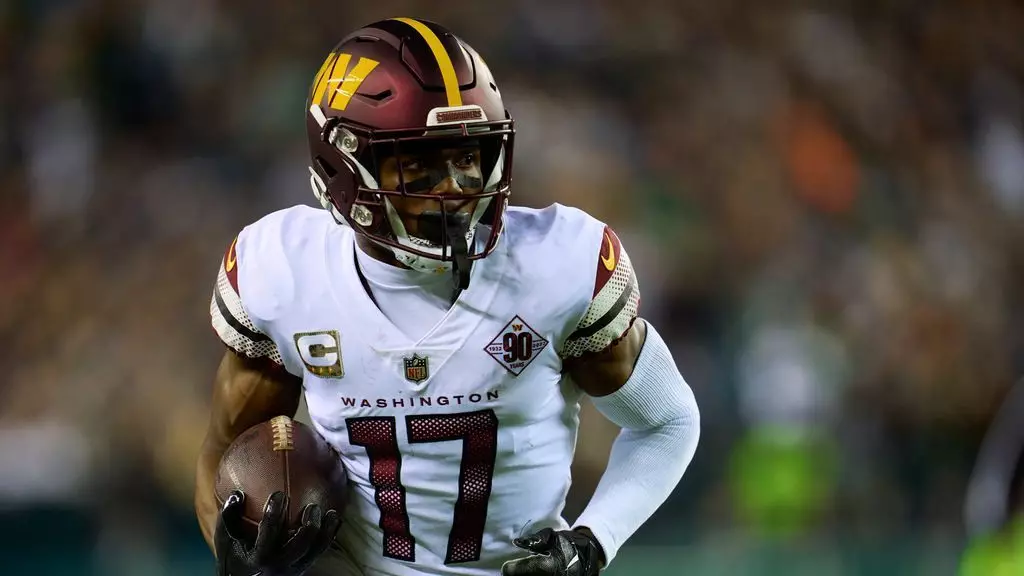In the high-stakes world of the National Football League, player transactions are often treated as mere business anomalies, yet beneath this veneer lies a profound lesson about athlete rights, recognition, and the evolving nature of professional sports. The recent situation involving Washington Commanders wide receiver Terry McLaurin exemplifies this tension—highlighting how star athletes are increasingly asserting their value beyond the traditional confines of team loyalty and institutional power. While some coaches and front-office executives dismiss trade requests as routine, it is imperative to critique this perspective and recognize the underlying message that players like McLaurin are sending: They seek fair recognition and meaningful negotiation, not just transactional commodities.
The NFL’s portrayal of trade requests and contract disputes as “business as usual” belies a deeper, systemic issue: the imbalance of power between athletes and franchise owners. Players invest relentless hours into their craft, often risking long-term health and sacrificing personal milestones. Yet, when they voice legitimate concerns about compensation, it is frequently dismissed or trivialized, fostering an environment where their voices are secondary. McLaurin’s trade request, coming after protracted negotiations and a lack of upward movement on his extension, is symptomatic of this imbalance. It is a plea for acknowledgment—not just of his on-field contributions but of his intrinsic worth as a player and an individual.
The narrative that players should quietly accept league-imposed limitations on their earnings ignores the broader context of athlete empowerment. By publicly requesting a trade, McLaurin is engaging in a form of resistance against a culture that undervalues veteran talent, especially at critical age points like 30 and beyond. It underscores a vital truth: Top-tier players are no longer willing to accept contractual stagnation or superficial negotiations. They want recognition that matches their on-field excellence and aligns with current market standards. This shift signals a maturation of athlete agency, one that demands a re-evaluation of how contracts are negotiated and valued across the league.
The Market and Age Disparities: Why Fair Compensation Matters
The core issue fueling McLaurin’s trade demand lies in the stark disparity between NFL salaries at different ages and the league’s inconsistent valuation of wide receivers. McLaurin, a consistent 1,000-yard receiver with multiple Pro Bowls, finds himself at a financial crossroads. Despite matching the production of younger stars like DK Metcalf—who signed a lucrative $32.5 million per year deal—the financial recognition McLaurin seeks remains elusive. The reluctance of the Commanders to commit to top-tier pay for a player approaching 30 exposes a troubling bias: the league’s tendency to devalue aging players, even when their performance remains elite.
This bias contributes to a toxic cycle where athletes are pressured into accepting early, insufficient contracts or risking their career longevity on uncertain negotiations. McLaurin’s case exemplifies the urgent need for a redefinition of success metrics—where loyalty and past performance are duly rewarded regardless of age. The NFL must confront its ageist tendencies and recognize that maintaining a premier athlete’s motivation and well-being involves equitable compensation. Otherwise, it risks alienating its most important assets, leading to diminished performance, fan disillusionment, and ongoing labor disputes.
Furthermore, the league’s narrative around “business,” while pragmatic, often serves as an excuse to overlook the human element. Athletes are multidimensional individuals whose careers are finite and unpredictable. Labeling a trade request as “normal business” undermines the genuine frustration many players feel when they are undervalued, and it dismisses the importance of fostering a culture that values longevity and fairness. The NFL’s ability to adapt and prioritize the welfare of its stars could become its greatest strength, fostering loyalty and elevating the sport’s integrity.
Player Power and the Future of NFL Negotiations
In today’s NFL landscape, player empowerment is no longer just a fringe movement; it is becoming a fundamental shift shaping the league’s future. Athletes like McLaurin are increasingly willing to challenge traditional hierarchies, raising their voices and demanding equitable treatment. This evolution is promising, showcasing a sports culture where talent, longevity, and professionalism are recognized and protected.
However, the league’s resistance to such change reveals a lingering reluctance to relinquish control. As contentious negotiations continue, the NFL faces the question of whether it will adapt to this new era of player-powered professionalism. Coaches like Dan Quinn, who downplay the significance of trade requests, may overlook the fact that these are symptoms—rather than symptoms alone—of systemic issues that need addressing. For genuine progress, the league must foster a climate where players feel respected, heard, and fairly compensated rather than silenced or dismissed.
The ongoing debate around contracts and trades illustrates a broader societal dynamic: the need for genuine recognition of individual worth amid a heavily commercialized and profit-driven system. McLaurin’s stance, and the budding wave of athlete activism, challenge the league to rethink its priorities. Will the NFL continue to treat players as interchangeable assets, or will it evolve into a league that values its stars as partners in the sport’s growth and legacy? That decision will determine whether we see players like McLaurin celebrated as vital contributors or sidelined as expendable commodities.


Leave a Reply